5 Days Study Plan: Cell Cycle & Cell Division | Biology Class 11 - NEET PDF Download
5-Day Study Plan for Cell Cycle & Cell Division
Let’s dive into the Biology chapter Cell Cycle & Cell Division, a vital topic for the NEET exam. Analysis of past NEET questions (2016–2024) shows this chapter is frequently tested, with questions focusing on mitosis, meiosis, and cell cycle regulation. Mastering this chapter is essential for understanding cell growth, reproduction, and genetic continuity, which are foundational for biology.
Meeting Your Timetable Goals with EduRev!
This 5-day study plan provides a structured schedule to manage your time effectively, ensuring thorough learning and practice of Cell Cycle & Cell Division. By following this plan diligently, you’ll be well-prepared to tackle even the most challenging NEET questions. EduRev simplifies your preparation with resources like chapter notes, videos, and tests. Access these at EduRev NEET.
Chapter Overview
The Cell Cycle & Cell Division chapter in Class 11 Biology covers the following key topics:
- Cell Cycle and its Phases (Interphase, M Phase)
- Mitosis and its Stages
- Meiosis and its Stages
- Significance of Cell Division
This 5-day plan allocates 4 days to cover these topics and 1 day for revision and practice.
Recommended Tip: Review past NEET questions from NEET Previous Year Questions (2016–2024): Cell Cycle & Cell Division to understand question patterns and difficulty levels. This will help you focus on high-yield areas.
Day 1: Cell Cycle and its Phases
Morning
- Read the NCERT Class 11 Biology textbook section on the cell cycle, focusing on interphase (G1, S, G2) and M phase. Refer to NCERT Textbook: Cell Cycle & Cell Division.
- Understand checkpoints and regulation. Make concise notes summarizing key phases.
- Watch Cell Cycle & Its Phases for a visual explanation.
Afternoon
- Explore the Mind Map: Cell Cycle & Cell Division for a visual overview.
- Study Chapter Notes: Cell Cycle and Cell Division for additional insights.
- Review PPT: Cell Cycle & Cell Division for a structured summary.
Evening
- Solve NCERT questions on the cell cycle. Check answers using NCERT Solutions: Cell Cycle & Cell Division.
- Attempt Test: Cell Cycle (NCERT) to reinforce concepts.
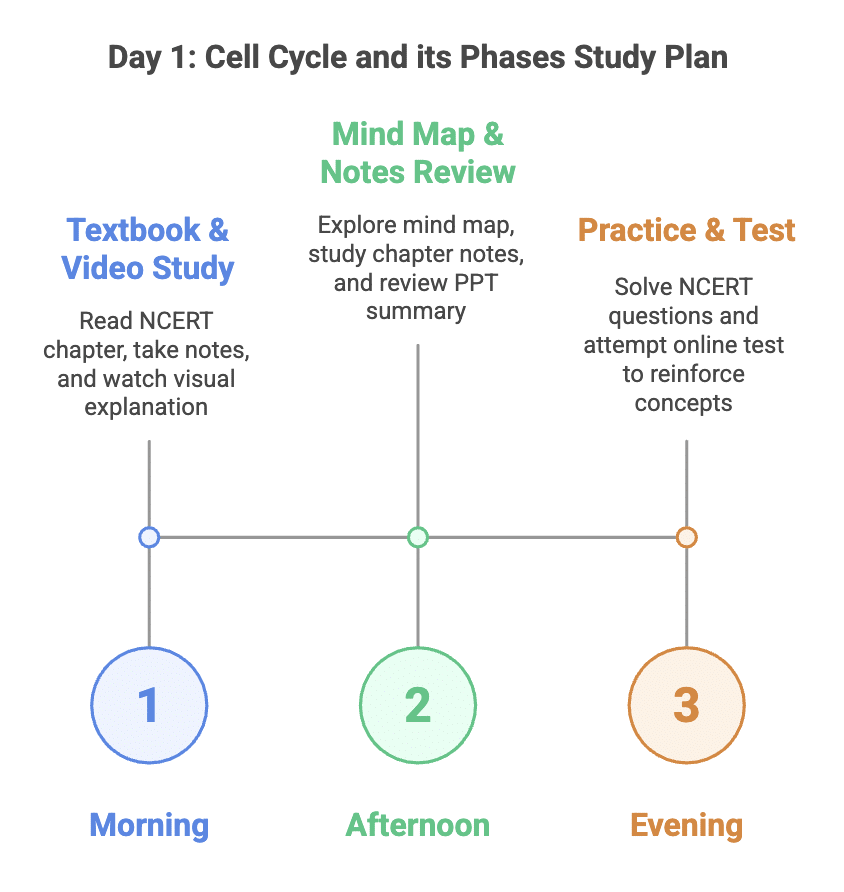
Day 2: Mitosis and its Stages
Morning
- Read the NCERT section on mitosis, focusing on stages (prophase, metaphase, anaphase, telophase) and cytokinesis. Use NCERT Textbook: Cell Cycle & Cell Division.
- Note key events in each stage. Study Important Diagrams: Cell Cycle and Cell Division for clarity.
Afternoon
- Watch Cell Cycle & Mitosis for a detailed explanation.
- Use Mnemonics: Cell Cycle & Cell Division to memorize mitosis stages.
- Review Flashcards: Cell Cycle and Cell Division for quick revision.
Evening
- Solve NCERT questions on mitosis. Refer to NCERT Solutions: Cell Cycle & Cell Division.
- Attempt Test: Mitosis (NCERT) and Test: Mitosis.
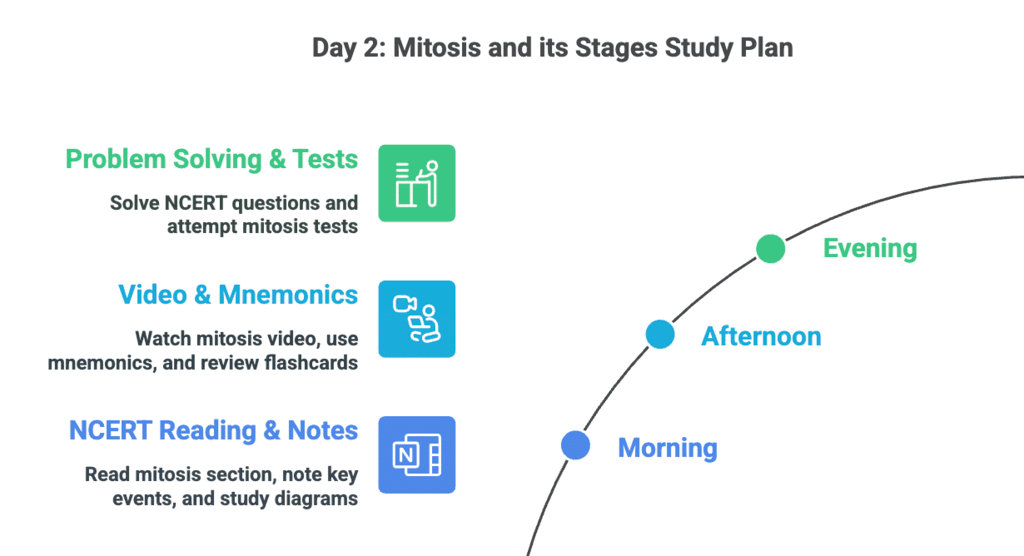
Day 3: Meiosis and its Stages
Morning
- Read the NCERT section on meiosis, focusing on meiosis I and II, and key events like crossing over and independent assortment. Use NCERT Textbook: Cell Cycle & Cell Division.
- Make notes on stages and significance. Study Important Diagrams: Cell Cycle and Cell Division.
Afternoon
- Read Meiosis: Types, Stages & Significance for deeper insights.
- Use Mnemonics: Cell Cycle & Cell Division to recall meiosis stages.
- Review PPT: Cell Cycle & Cell Division for visuals.
Evening
- Solve NCERT questions on meiosis. Check NCERT Solutions: Cell Cycle & Cell Division.
- Attempt Test: Meiosis to test your understanding.
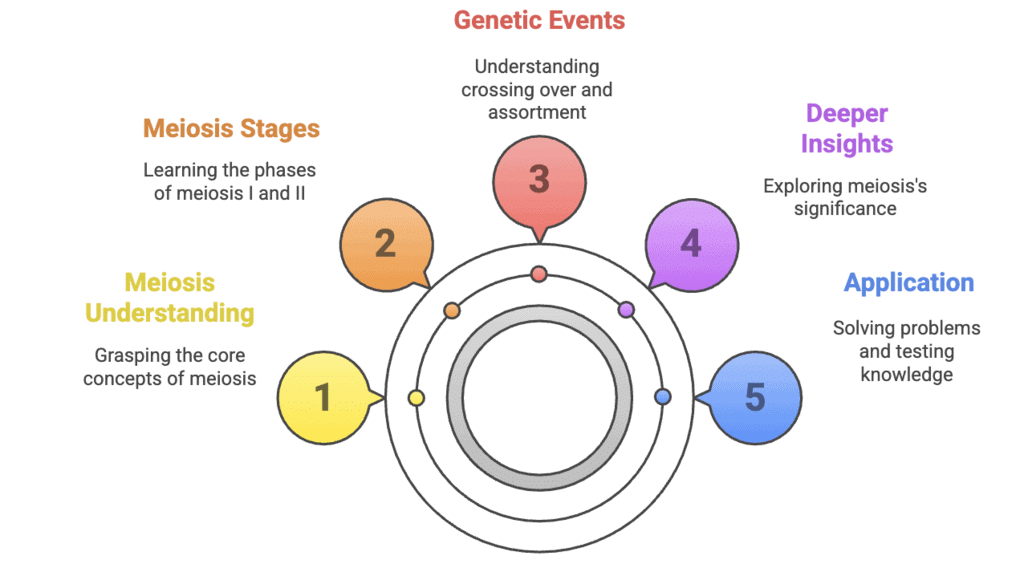
Day 4: Significance of Cell Division
Morning
- Read the NCERT section on the significance of mitosis and meiosis (e.g., growth, repair, reproduction). Use NCERT Textbook: Cell Cycle & Cell Division.
- Note differences between mitosis and meiosis. Refer to Chapter Notes: Cell Cycle and Cell Division.
Afternoon
- Study NCERT Exemplar: Cell Cycle & Cell Division for advanced questions.
- Review Flashcards: Cell Cycle and Cell Division for quick facts.
- Explore Mind Map: Cell Cycle & Cell Division for a summary.
Evening
- Solve questions from NCERT Exemplar: Cell Cycle & Cell Division.
- Attempt Test: Cell Cycle & Cell Division - 1 and DPP for NEET: Daily Practice Problems.
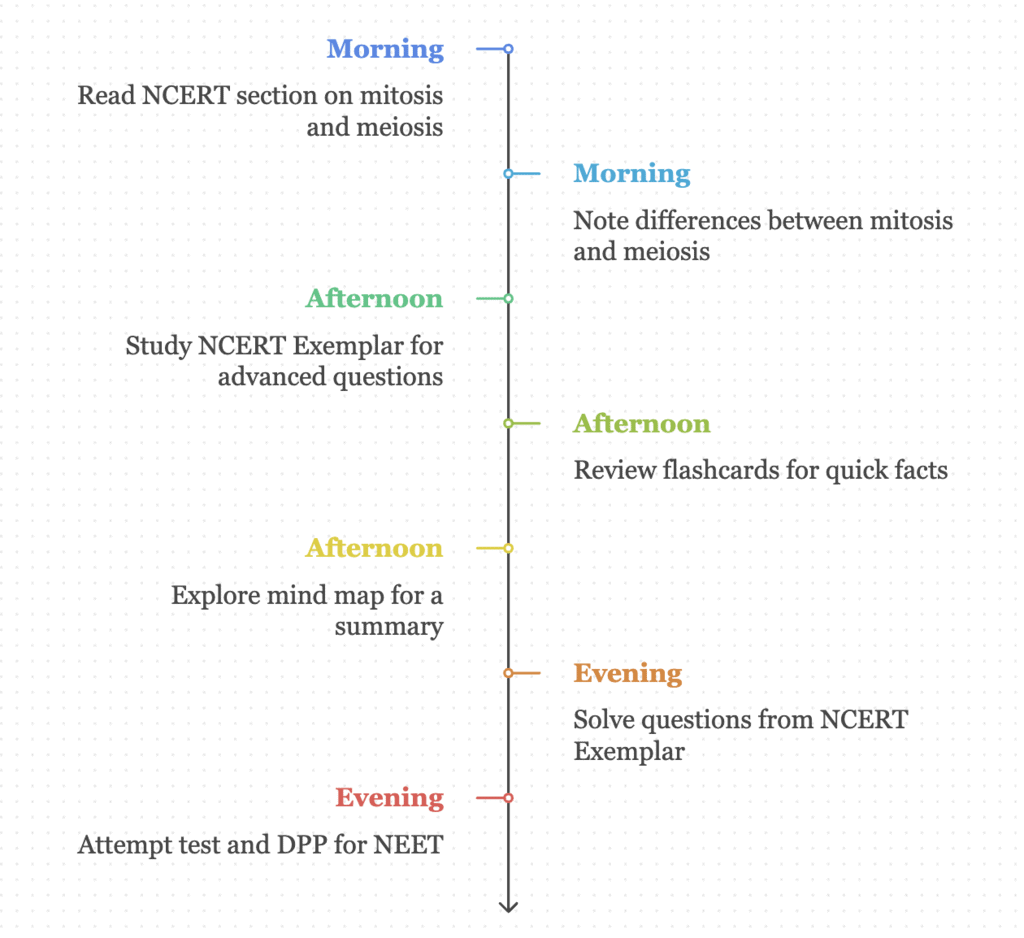
Day 5: Revision & Practice
Morning
- Review your notes from Days 1–4, focusing on key concepts, diagrams, and differences between mitosis and meiosis.
- Use Mind Map: Cell Cycle & Cell Division and PPT: Cell Cycle & Cell Division for a quick recap.
Afternoon
- Revisit all NCERT and EduRev questions solved earlier. Refer to NCERT Solutions: Cell Cycle & Cell Division and DPP for NEET: Daily Practice Problems (Solutions).
- Clarify doubts using Chapter Notes: Cell Cycle and Cell Division.
Evening
- Discuss doubts with peers or a mentor if needed.
- Take a full-length mock test with Test: Cell Cycle & Cell Division - 2.
- Solve questions from NEET Previous Year Questions (2016–2024): Cell Cycle & Cell Division.
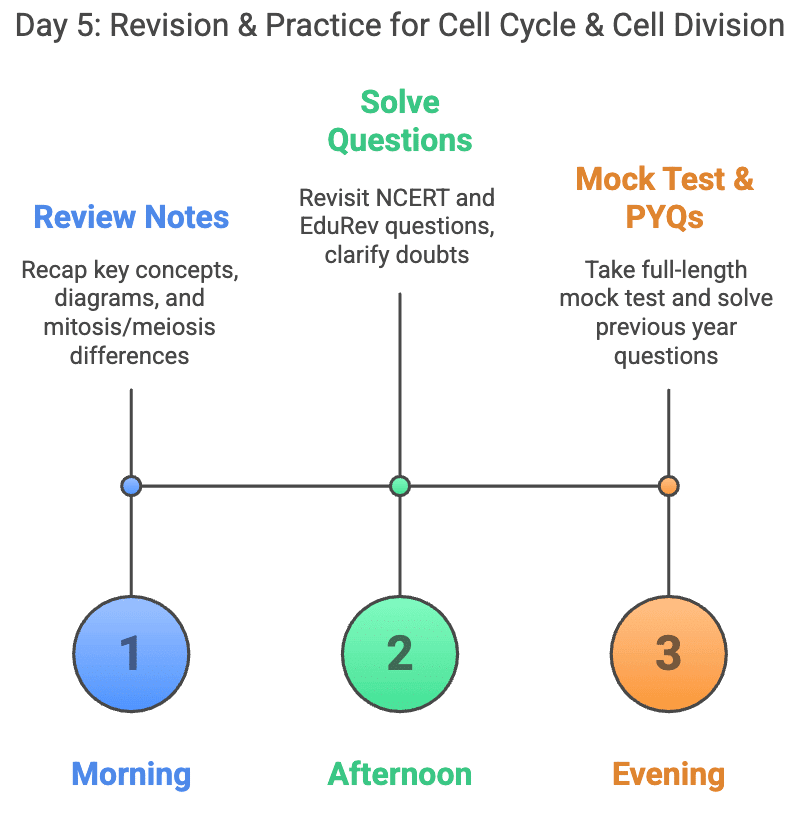
Why This Plan Works
NEET questions on Cell Cycle & Cell Division often test stages of mitosis and meiosis, their significance, and regulation. Solving past years’ questions from NEET Previous Year Questions (2016–2024): Cell Cycle & Cell Division helps identify weak areas. If a question feels tricky, revisit the topic using Chapter Notes or Important Diagrams and practice more.
Important Links for Cell Cycle & Cell Division
- NEET Exam
- NEET Previous Year Questions (2016–2024): Cell Cycle & Cell Division
- PPT: Cell Cycle & Cell Division
- Chapter Notes: Cell Cycle and Cell Division
- NCERT Solutions: Cell Cycle & Cell Division
- NCERT Exemplar: Cell Cycle & Cell Division
- Important Diagrams: Cell Cycle and Cell Division
- Mnemonics: Cell Cycle & Cell Division
- Flashcards: Cell Cycle and Cell Division
- Mind Map: Cell Cycle & Cell Division
By following this 5-day study plan and leveraging EduRev’s comprehensive resources, you’ll master Cell Cycle & Cell Division and be well-prepared to excel in the NEET exam. Good luck!
|
169 videos|524 docs|136 tests
|
FAQs on 5 Days Study Plan: Cell Cycle & Cell Division - Biology Class 11 - NEET
| 1. Why is the cell cycle important for NEET preparation? |  |
| 2. What are the main phases of the cell cycle that I should focus on for NEET? |  |
| 3. How does the process of mitosis differ from meiosis, and why is this distinction important for NEET? |  |
| 4. Can you explain the role of checkpoints in the cell cycle? |  |
| 5. What are some common disorders related to errors in the cell cycle, and how might they be presented in NEET? |  |

















